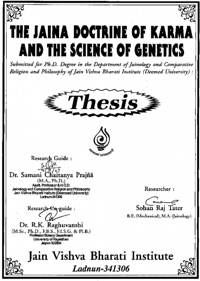(i) Fasting Completely (Anaśana)
Anaśana means fasting, renouncing food and water etc. for a day, for many days or throughout one's life. One day of total fasting is called upavāsa. Fasting completely until death is done, when life is close to an end. Such fasting is considered very auspicious and is called physical Anaśana. Bhāva Anaśana refers to the total control of our inner desires for a short or long time. If this austerity is cultivated then only one becomes able to strive for spiritual upliftment.
(ii) Partial fasting (Unodarī)
Unodarī means eating less than what one's hunger is. The Jaina dharma prescribes thirty-two handfuls of food per day and in order to perform this austerity, one may eat a few handfuls less than the prescribed limit. Bhāva UNodarī means to limit our desires to some extent. It may be more difficult to do this than to control them totally. But with the regular practice one can limit his inner desires.
(iii) Limiting the number of items of the food (Vṛti Saṅkṣepa)
In Vṛti Sañkṣepa, we put a limit on the number of items we eat during a single sitting or throughout the day. Bhava VṛtiSañkṣepa means to limit of desires for some part of a day or a whole day. This austerity will help us to control our desires so that our mind will keep off from wandering.
(iv) Limiting desired tasty food (Rasa parityāga)
Rasa parityāga means to renounce tasty foods which one likes very much. It can be done partially or in total for a short time or prolonged period of time. Bhāva rasaprityāga is more difficult to perform than the other austerities because in this most desired thoughts are limited. An austerity of this nature will help us to control our passions even in the most tempting situations.
(v) Bodily Endurance (Kāya kleśa)
Kāykaleśa means to stand or sit in a particular posture for a long time. This austerity may cause pain, but one should ignore the pain. In Bhāva Kāyakleśa one stands firm in controlling passions even if temptations are great.
(vi) Controlling of senses (Pratisañlīnatā)
In pratisañlīnatā one controls all types of senses in order to prevent pleasant and unpleasant temptations. In order to perform this austerity, one may stay in isolation for one or more nights. In bhāva pratisañlīnatā, one controls oneself from telling distorted truth, or from participating in sensual activities. Thus this austerity helps to control passions like anger, pride, deception an greed.
 Prof. Dr. Sohan Raj Tater
Prof. Dr. Sohan Raj Tater
 Doctoral Thesis, JVBU
Doctoral Thesis, JVBU